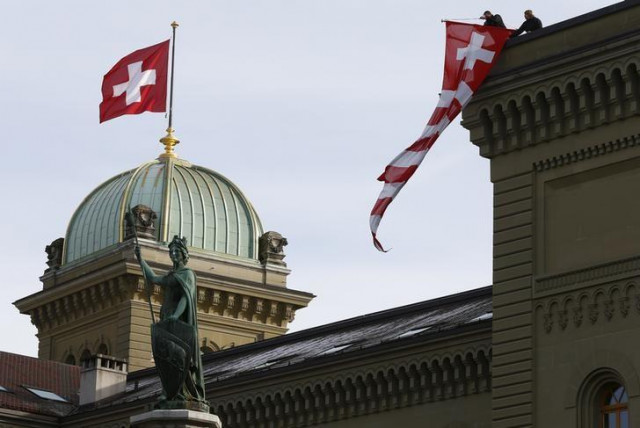With new plan, Swiss pin anti-extremism hopes on prevention
Swiss Intelligence Service said last month it was tracking 550 people deemed a potential risk to Switzerland

Workers hang up a Swiss flag on the Swiss parliament building in Bern, Switzerland. PHOTO: REUTERS
The Swiss so far have avoided the kind of attacks that have hit neighbouring Germany and France, but the Swiss Intelligence Service said last month it was tracking 550 people deemed a potential risk to Switzerland as part of its "militant monitoring programme," up from 497 people at the end of 2016.
Last month, Swiss and French police combined in a cross-border anti-terrorism swoop in which 10 people were arrested. Several high-profile criminal prosecutions have been carried out against people accused of supporting banned groups, including al Qaeda or Islamic State.
Swiss probe top Muslim leader over extremist propaganda
Over the past 14 months, Switzerland developed the new action plan, which includes 26 measures to better counter such threats. The government is setting aside 5 million Swiss francs ($5.08 million) to support the programme over five years, although officials said the main responsibility for implementing programmes lies at the local rather than federal level.
"If you want to stop terrorism, you cannot wait until it is at your door and the police have to take action, you have to tackle it much earlier," Justice Minister Simonetta Sommaruga told a news conference.
"If we want to accomplish something, we have to prevent people from being radicalised in such a way that they resort to violence and turn themselves into terrorists."
Swiss man's Jack Daniel's flag mistaken for that of Islamic State
Neutral Switzerland has not participated in wars in the Middle East, but some fear domestic policies could put the country in the crosshairs of extremists.
Voters in 2009 banned the construction of new minarets, and the Italian-speaking canton of Ticino has banned facial coverings. A national referendum to ban burqas is also in the works.
The action plan comes on top of a separate effort by Bern to tighten anti-terrorism laws, a push that could toughen sentences for people who support violent extremism and boost cooperation with other countries' intelligence services.



















COMMENTS
Comments are moderated and generally will be posted if they are on-topic and not abusive.
For more information, please see our Comments FAQ